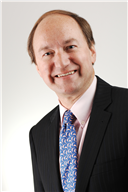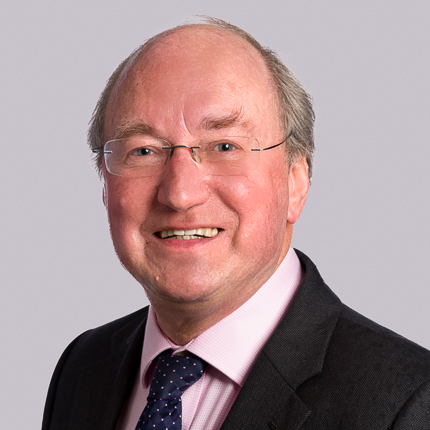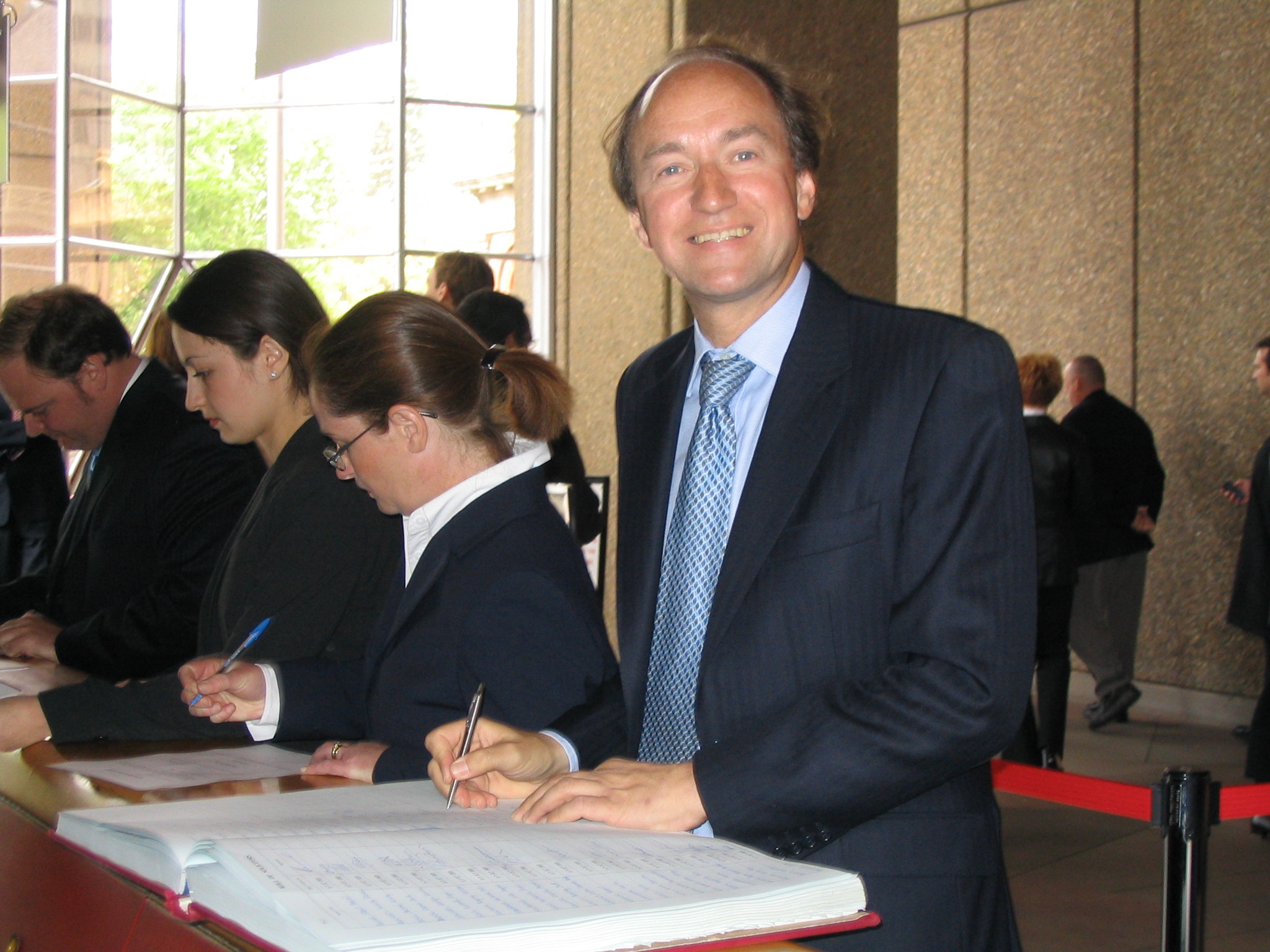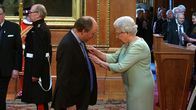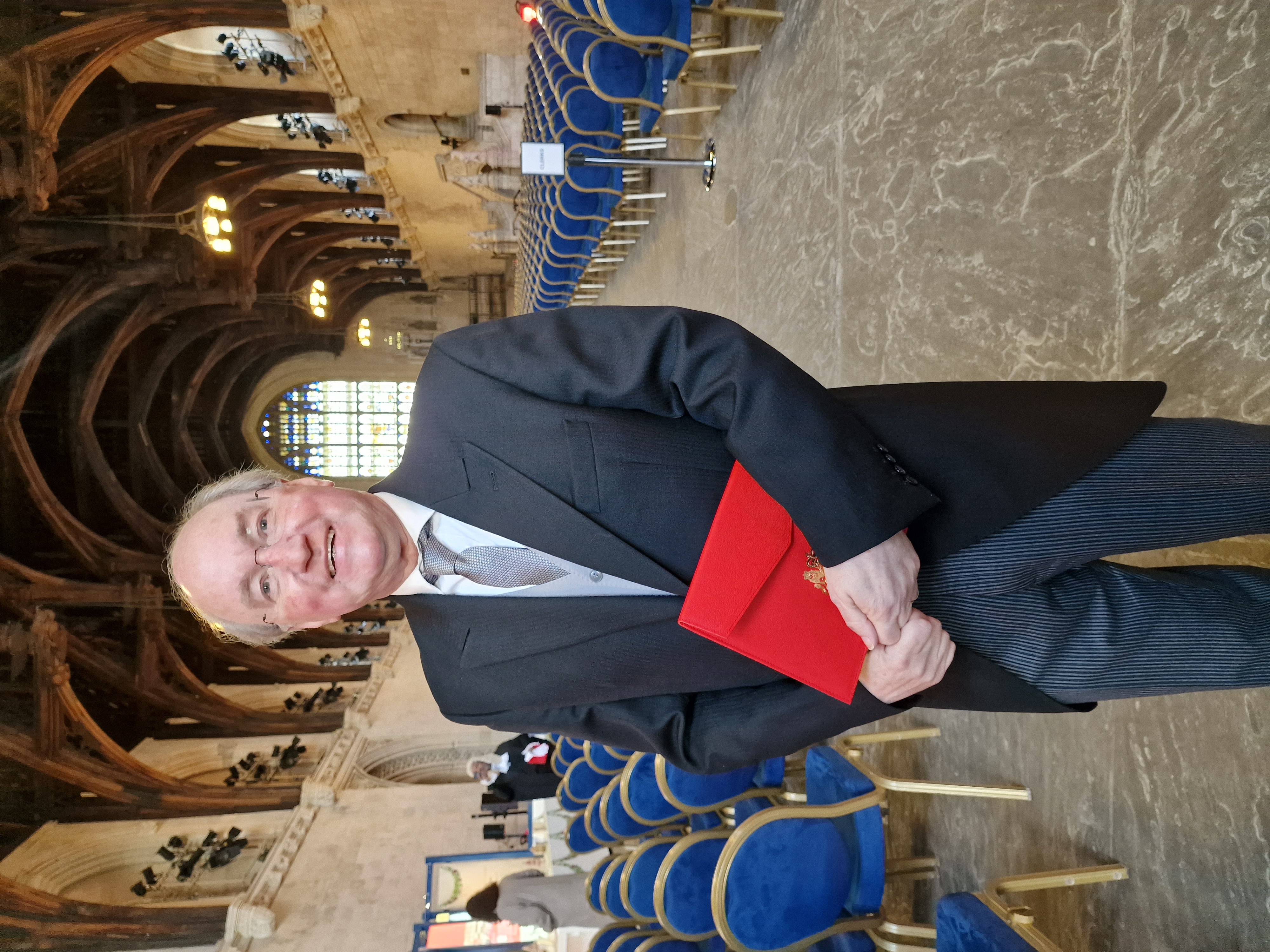
Interview with Professor David Hodson
Published: 21/11/2023 07:00
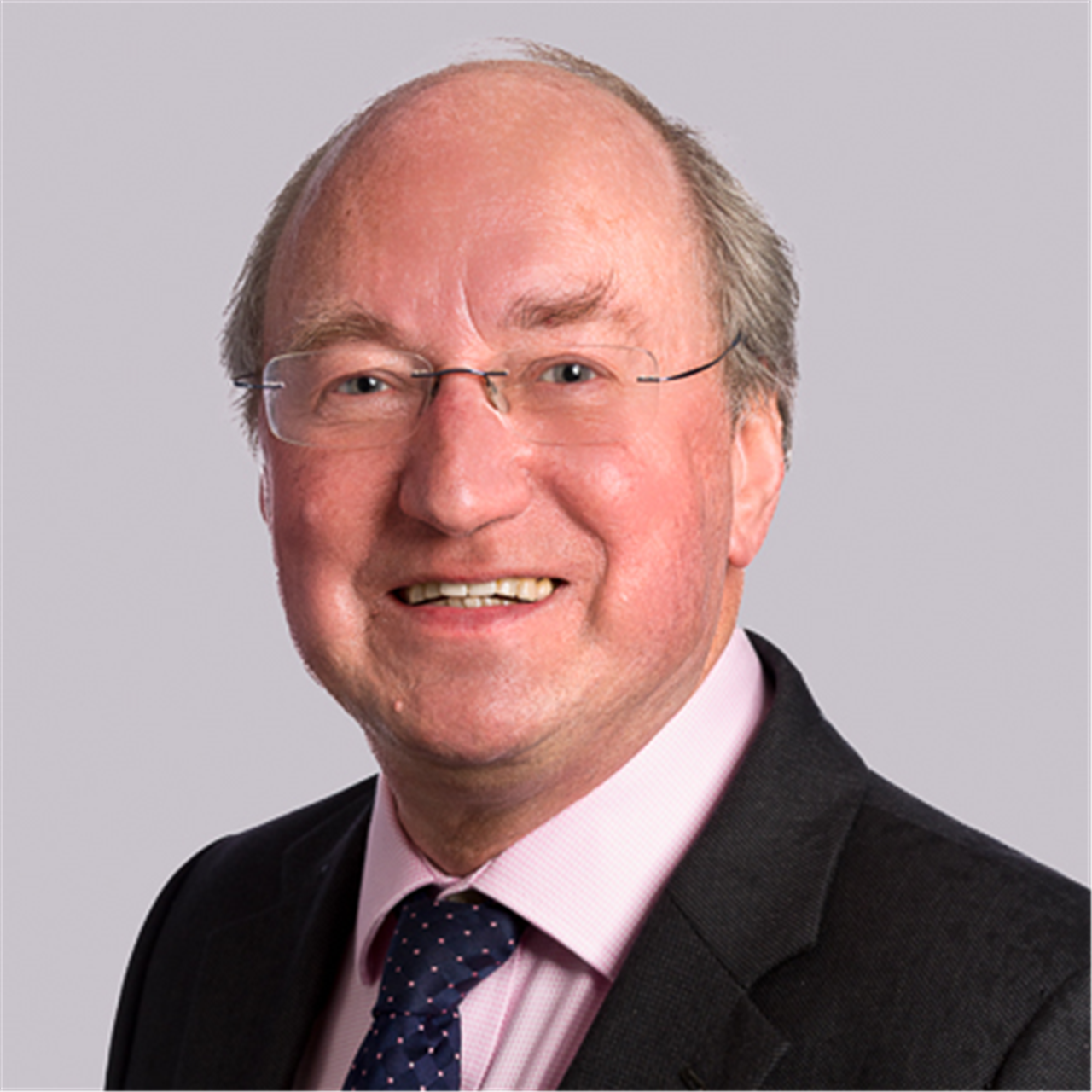
The Life and Career of Professor David Hodson OBE KC(Hons) MCIArb, Solicitor, Mediator, Arbitrator, Australian Solicitor and DDJ
David, what was your background?
It was modest. My father won a scholarship to a grammar school in Southampton but like so many, the war interfered with his education and he could not fulfil his potential. He was very bright and it must been frustrating. I passed the 11+ and went to a grammar school. I’m proud to be part of the 93% of the population from state education. In my generation in the law in central London, we were a real minority. I couldn’t do my preferred subjects of geography and maths at university so did sociology and law but without any intention of becoming a lawyer. With a degree and with 100% grants, and no idea what else to do, I did the 6 months solicitors’ training. And then it made sense to qualify. So, on 1 March 1976, I started my articles, as they then were, in a firm in Southampton. I enjoyed it and seemed to thrive. Then one could be a complete generalist. I did conveyancing, crime, civil and family. After a year I packed up conveyancing but continued as a general litigation lawyer for a number of years. That served me well later. I worry about the narrow specialisation required of newly qualified solicitors now. The broader litigation skills and knowledge are valuable.
After a couple of years qualification, I went to Birmingham to work for a tremendous firm, Anthony Collins and Co. Anthony had set up his own firm a couple of years earlier and was incredibly enthusiastic, innovative and entrepreneurial. I learnt so much from him. After a year, I had what seemed a marvellous opportunity of a London Inns of Court law firm. It came highly recommended. It was a disaster. So backward, so old-fashioned, so hierarchical, with all the worst elements of the profession. I somehow endured 3 years until they mercifully called time. So it was on 2 January 1985 I signed on as unemployed at the Kingston upon Thames Labour Exchange. I remember being rather despondent; 5 years qualified and what now? But I had contacted a locum agency and I received a telephone call that afternoon about a job and I started the following day. Only one day on the dole! I had the most enjoyable 8 months working as a lawyer locum in a variety of firms. I learnt so much about getting to grips quickly with the important elements of a case. In one firm I was given 300 active files to deal with. One learns quickly what is important. Then in the August, there was an advert to join a major City law firm doing family law, the area in which I now wanted to practice. I applied and had the interview. They were keen for somebody to start quickly. I was told that if I could join in a week the job was mine. I was beginning a 3-month contract for the North Vauxhall Law Centre. I remember ringing the agency from a phone box immediately after the interview. They kindly broke the contract. From a Law Centre to the City. Hardly standard career progression. I took a week off at the local university library reading every book I could find on family law.
And then I joined Theodore Goddard.
Was that your big break?
Undoubtedly. They were one of the top firms, with the pedigree of having acted for Mrs Simpson. Most crucially I was working for Mrs Blanche Lucas, one of the top family lawyers of the second half of the 20th century. Incredibly international, multi-lingual, of several nationalities, also much married, she cut her teeth at the Nuremberg trials and had been involved in many big cases over the decades. We were very different but got on very well. I started as an assistant, became an associate, partner and head of the family law department within 4 years. Those were the days of the yuppie culture, long working hours but good pay, the Big Bang in the City. It was hard work but really exciting.
In 1986, with the 1984 legislation on clean breaks, we had a case where we used a calculation (created by Tim Lawrence of Coopers & Lybrand) to amortise income needs. The first case in which it was used. I remember Mathew Thorpe and James Holman as juniors getting to grips with it and negotiating its terms. A year or so later it was used in a reported decision and given a name: Duxbury.
We had a client who owed us lots of costs, but we knew we would get a lump sum. We needed security. We approached our commercial department. Easy they said. Assign the right to a lump sum as a chose in action. They drafted the contract. It worked. It was picked up and used by other law firms. It was tested in court and became known by the law firm then using it in that case: the Sears Tooth charge.
Setting out income needs was ad hoc. I was sure we could do better. I created what was probably the first pro forma omnibus income requirements document. Although I’ve updated it every 5 years or so, I’m still amused when I see forms following the same structure and wording created in the late 1980s.
With no previous experience of public speaking, I was given a trial run of a graveyard slot of 20 minutes at a law training conference on the dull topic of tax on divorce. Four weeks before the conference, the then Chancellor, Nigel Lawson, totally changed the tax treatment of maintenance payments imposing a very short deadline to have tax effective court orders. The delegate list went from 40 to 250 within days. The organisation, CLT, held their nerve and kept me as the speaker but I was now first on and with an hour. It was daunting. From this, speaking at training for lawyers has become frequent and enjoyable, both here and abroad. I have had so many wonderful opportunities to learn in my career that I have wanted to share as much as possible within the profession.
In those days, there was little professional training especially outside of London. There were also very different regional variations on the way the law was being applied. So in 1988 as part of the SFLA, now Resolution, we created the roadshow. An afternoon of lectures delivered around the country to help regional lawyers and produce some standardisation. Four of us gave those original lectures; I remember Roger Bamber was one of the other speakers on that first tour. It continued successfully for many years, and was the catalyst for creating a number of regional groups.
There was pressure in the late 1980s on private client work in City firms. So in 1991 Blanche Lucas and I and our entire family law department at TG (and clients) moved to Frere Cholmoley. It was an ideal match in lots of ways. The firm had offices around Europe and it was really exciting working alongside lawyers abroad. That excitement hasn’t gone away.
Practice management was very much in its infancy. But it was obvious that running a family law department successfully needed knowledge and skills beyond being a lawyer. I gave a series of lectures on family law practice management around the country, then writing the first textbook on the subject, The Business of Family Law, for Jordans. I’m delighted the book was used by so many setting up and running family law departments over the years.
At the age of 41 I applied and became a Deputy District Judge at what was the Principal Registry of the Family Division. Then it was a mark of prestige and kudos for law firms to have partners who were deputy judges. They were in firms such as Manches, PHB and Dawson Cornwell. It’s a great pity that with the pressure on time recording and billing, there are now few senior solicitors in the bigger family law practices sitting as deputies in London. Being a DDJ has been a phenomenal part of my practice, and I am a far better solicitor through my insights on the other side of the bench. I would recommend solicitors to consider it strongly. Sadly, in my view, there is discrimination against solicitors being appointed beyond the District Judge bench. One can only hope it will change soon.
You were 10 years in the City. What then?
I was on the National Committee of Resolution for about 8 years. I remember a meeting in Birmingham. On the train back I fell into conversation with another London lawyer who, like me, was becoming dissatisfied with the litigation direction of practice. She was discussing with others the setting up of an innovative law firm. I was invited to join and on 1 September 1995, the world’s first metropolitan practice to combine lawyers, mediators and counsellors opened for business in Covent Garden. We had three lawyers and two non-lawyer mediators and counsellors. It was advertised as a one-stop shop. It received a huge wave of acclaim. ADR, specifically mediation, was big news. We had a huge spread in The Times. Within a couple of months, the government introduced no-fault divorce legislation which had a key element of mediation. The Lord Chancellor very publicly visited us to support our concept. We were joined by other innovative lawyers. It was a time of blue sky thinking and enterprise, looking at where we could push boundaries of practice to produce a better holistic service for those involved in family breakdown.
I qualified as a mediator and in a couple of years became vice-chair of the UK College of Family Mediators, the umbrella for the several different mediation organisations. It was in the immediate aftermath of the 1996 legislation and we were looking at the best ways of delivering mediation to the public and the profession. But it was obvious to me that it was then being handicapped by the conflicting interests of the separate mediation organisations. They each sought government funding and priority for their own way of working. There was a purity of mediation philosophy which seemed to work against adaptability for different client needs. (It may have changed now.) I have remained a mediator and it’s a great way to resolve disputes. But sadly I’m not too surprised it has not thrived as it should or could.
One of my heroes was John Cornwell, the originator of the SFLA/Resolution code of practice. I have felt throughout my career that the way we do our work and engage with our clients is as important as some of the detail of the outcomes. I was delighted to be asked to be the first chair of the Resolution Good Practice Committee. By now the code was on its second edition but it was rather legalistic in its language; it had been written for lawyers after all. We contacted the Good English Society and with their input converted the code into simpler English. It was directed in the second person to the lawyer as ‘you’ and made much more personal. It was a success and has been copied ever since. But it was also too long. We stripped out certain elements and created separate Guidances for Good Practice in various aspects of family law, such as disclosure, writing letters, etc. I’m delighted there is now a real package of good practice guidance on aspects of our work.
By the late 1990s, Resolution had many members signed up to the Code. But there were instances of poor-quality work. What use was the Code if the work was not good? The answer seemed to be accreditation. A badge of expertise to go alongside commitment to the Code. By now I had visited Australia several times through family connections. Nobody in Australia after a few years qualified undertook the work unless they were accredited. We wanted the same. I remember importing the Australian accreditation scheme into England working alongside Ellie Chapman and Grant Howell. It should have been very successful. Sadly, in my view it hasn’t proved to be so. Two separate schemes were launched almost simultaneously by the Law Society and Resolution and have remained so ever since. The public was confused. Apart from some legal aid benefits for children lawyers, there is very little in the way of outward advantages compared to the position in Australia. It’s been disappointing.
It was during this period that I had another really low point. I found myself the subject of a negligence claim from a former high-profile client. The dispute was played out within the worldwide media and lasted 2 years. I thought it was very unfair because I knew the advice given had been good, including having had counsel involved. It was heart-breaking. It was settled on very good terms, as we perceived it, by our insurance company a week before a very public trial. Although without any liability admission, this could have ended a career. I personally believe it is through God’s grace that I came through this and recovered well. It certainly taught me what it was like as a party to go through very long, contested, public litigation and gave me far more sympathy and understanding for my clients.
You spent time in Australia. How did that arise?
After 7 years of really exciting innovation, the practice imploded. Some partners wanted to take a different direction. By now I had had 18 years at the top with very hard work. I wanted a new challenge rather than just slipping into partnership at a competitor firm. But what? I chatted with a good friend in Sydney who said he’d been looking to recruit a lawyer with international experience for some time. He invited me to come and join him for a couple of years. In the days before Zoom, I remember flying out on a Thursday, having an interview on the Friday, spending the weekend with family, having another interview on the Monday morning and flying back on the Monday evening. One wouldn’t do it now. But I did and I agreed.
My 2 years in Australia were one of the most enjoyable periods of my life. I had fast track qualification and became a New South Wales solicitor within 7 weeks of arrival. I acquired my NSW practising certificate and have retained it ever since. I relished aspects of Australian life. It was very much a meritocracy; little importance given to school or university or background. The law was similar but with nuances of being very different. I made incredible friends, inside and outside the law. It also gave me a chance to look back at England including English family law from the other side of the world. Sometimes one needs this to get a better awareness and perspective.
I came back after 2 years. It had been like a sabbatical. I felt renewed in energy and commitment. But what now? In Sydney much of my work was international. I had been involved in many international cases in London and was a very early Fellow of the IAFL in 1995. Even before Sydney, I’d had a vision of a practice dedicated distinctively to international clients. On returning, I shared this with Ann Thomas who was doing international children work. We set about putting this vision into reality and on 2 April 2007, we created The International Family Law Group. A law firm specifically geared to the needs of international clients. We knew there would be a demand, notwithstanding that we set up in the teeth of the global financial crisis! But we were swept away by the success, the work and referrals we received. In each of the first 4 years we doubled in size. We took on teams from other firms. We did child abduction work for the government. We were involved in very high-profile international cases, some pro bono. Very hard work but really enjoyable, not least as Ann and I married in 2011. Of course other firms copied and suddenly competitors announced they had an international department or team. New firms set up in direct competition. I have never worried about this. Good firms and lawyers with good ideas will succeed.
It was Edward de Bono who said don’t engage in competition but surpetition. In other words, don’t engage in the same territory, the same way of marketing, the same manner of client gathering, the same turf as others but go over and above, find the blue water, find the different way and there will be success. It’s hard. Anyone can put resources into competing on the same terms as others. But real success comes in finding the innovation, the enterprise and the new way of working. And with it comes real professional satisfaction. LinkedIn is full of events copying other events. Then every so often something new comes along and how refreshing.
My time with iFLG has been one of the most enjoyable of my career with tremendous cases, clients and colleagues. I love travel and there have been opportunities to travel for conferences and client work. We have the most incredibly complicated cases, with fact situations barely believable if set as a law exam question. But that is the life of international families. And the work continues.
You played a key role in originating family arbitration. How did that happen?
In Spring 2001, I felt there was little positive movement to out-of-court resolutions. I was on a plane to the Bahamas on holiday with time to think. At that time I had an excellent assistant whose boyfriend, now husband, was a shipping lawyer and she had told me of his work in arbitrations. So why not in family law? I remember ringing her from a red phone box on one of the outer Bahamas islands to ask her to find out all about arbitration in family law. There wasn’t any. So again I borrowed from Australia as they had introduced it a few years earlier. I got in touch with the Institute of Chartered Arbitrators who were very supportive. David McHardy, a fellow DDJ and former Resolution chair, and I did a trial family arbitration in a case being run through mediation. Whilst in Australia I kept in touch with the Ministry of Justice who were keen. On my return, we set up a group involving Resolution, FLBA, Centre for Child and Family Law Reform and the Chartered Institute of Arbitrators. There was no prospect of primary legislation, so we had to do it ourselves. We set up the rules and I remember writing them based on the Australian version. We set up training and membership. We had huge support from judges. We launched. Of course, it would have been good to have had more cases but it has succeeded as a vital component of out-of-court settlement for some cases. It has been particularly useful during times of judicial shortages. But I think it has had an additional benefit. The in-court FDR process is brilliant in my opinion. But outside the High Court, where they have the luxury of several hours to conduct an FDR, judges have limited time to get to grips with the case and help negotiations. Why not do it out of court? The private FDR. It was happening before the COVID-19 lockdown but the face-to-face restrictions gave it a huge boost. And most of the initial private FDR judges were qualified arbitrators bringing across their skills and experience to a fairly similar out-of-court quasi-judicial process. It has been one of the English success stories.
What else has been happening over recent years?
Soon after my return from Sydney, I was invited by the Resolution chair, Andrew Greensmith, to look into other forms of ADR. One outcome of our report was directive mediation, explicitly based on the Queensland model, where the mediator, invariably also a lawyer, is able to give a neutral steer to help the parties settle, as distinct from the more traditional and passive mediation model. We created distinctive clauses for the mediation agreement. I suspect most lawyer mediators are now working off this model.
I had already written many articles about aspects of family law. I was invited by Jordans, now LEXIS-NEXIS, to write a weekly article on international family law. I did so for about 3 years. It was a real challenge finding something to write each week but from the challenge came the resourcefulness. I learned a lot from doing so and hopefully raised the profile of international work.
We had the Red Book on national law but there was nothing comprehensively on international. I invited LEXIS-NEXIS to agree a textbook, The International Family Law Practice. The first edition was mostly a collection of lecture notes and articles, a modest paperback. It proved highly successful. Six editions later, it is now a massive tome. There are a dozen contributory authors, each specialist in their distinctive field, with about 25 chapters and a couple of thousand pages. It is testament to the way in which international work has expanded.
An undoubted highlight of my career was receiving the OBE in 2014 from Her Majesty the late Queen for services to international family law. Ann, my father and my best friend from schooldays, Peter, and I had a wonderful day in Windsor Castle. The Queen said that it must be a very difficult area of work and I remember saying it was. Another highlight was being made an honorary silk, now KC, for contribution to the improvement of English law and practice, although honorary silks don’t dress up! I would never have expected this at the beginning of my career. One doesn’t work for these things but it’s jolly nice when they happen.
I was delighted to be made an Honorary Professor at both my old University, Leicester, and at the University of Law. I had stayed in touch with each and in recent years had been giving annual lectures as well as helping them make their courses practical and applicable for those intending to enter the solicitors’ profession and help the next generation of lawyers.
I have continued sitting as a part-time judge even including coming back to sit when I was in Sydney. I was delighted with the reforms by Sir James Munby in introducing a specialist family court. We had had this in London anyway, but it was well overdue. More important for me was the setting up of the Financial Remedies Unit in London dealing with complex financial cases. I was one of its first judges and I now almost only deal with financial remedy cases. I’ve enjoyed these last few years much more as a consequence, although deputy judicial sitting has become much busier and far more demanding. Having sat only in central London since 1995 but having during lockdown moved to South Devon from Surrey, when it became obvious that I could run my practice just as well remotely, I have in the last couple of years also been sitting in parallel on the Western circuit in the south-west of England. Of course, the asset base is often much lower than London. I’ve been really impressed by the quality, calibre and commitment of the local practitioners. My heart remains however at the CFC, my legal home for decades.
I almost dare not mention Brexit! But I was one of a small group of UK family lawyers working closely with the Ministry of Justice throughout the Brexit process on what would be the laws for that transition period and after departure, representing the family law professions of the UK nations. It was hard work and complicated, dealing with statutory instruments and legislative policy a long way outside normal family law expertise. The outcome for family law could have been better, but without our involvement I’m sure it would undoubtedly have been far worse. In the run-up to the final departure, I wrote a book for practitioners, published by LEXIS-NEXIS, on the transition process and what would be the new law once we left the EU. Some lawyers gave dire warnings about the disastrous state of affairs if we didn’t stay within EU family laws; none of these have yet come to pass although I was highly disappointed that the EU would not adopt the same stance as the UK in mutual recognition of international domestic violence protection laws. This is vital and domestic abuse victims should not be pawns in political games.
So what remains?
I still have several projects along with my client work.
I have been frustrated that we have no real international family mediation profession. After pushing for some time, I’m pleased that this year a small group of us around the world, under the auspices of myself and an Irish mediator, Roisin O’Shea, are working on documents which will create an easier opportunity for international families to go into and settle through mediation.
With my green hat on, I’ve been pleased to co-author a report for the IAFL for more environmental awareness and sustainability for an organisation which holds several worldwide conferences annually with masses of air travel. It will be a real challenge for the future.
Another frustration has been the continued disputes regarding jurisdiction and forum, standing in the way for international families to come to a settlement. A few years ago a very good friend, Professor Patrick Parkinson of Australia, and I set up an international family law arbitration scheme with a number of part-time or recently retired judges and senior lawyers acting as arbitrators, from a country not involved in the dispute, to find the closest connection country and thereby resolve jurisdiction and forum. Sadly it hasn’t yet taken off. I’m sure it will happen. In the meantime, I’m keen to find a way for a universal, global family law jurisdiction and forum criteria through means of a hierarchy. The EU had been interested and I hope may yet be willing to go down this road to benefit international families.
I have throughout been very interested in digital technology. I was one of the first family lawyers on the internet. I remember being part with Nicholas Mostyn of a very basic service called LINK in the early 90s. I had a CompuServe email address consisting only of numbers and I acquired my own eponymous domain quickly. I experimented in the late 90s with voice recognition which I have been using consistently since 2005; DragonDictate has probably transformed my practice more than any other feature. More recently I and a couple of iFLG colleagues were able to adapt the Settify model for English law. I have other ideas and there’s so more which can be done and must be done. There is no doubt AI will dramatically affect practice. Another of my heroes is Richard Susskin, a real visionary. A few years ago my firm had a couple of away days going through his book: Tomorrow’s Lawyers. I commend his writings about what will happen within our profession over the next 5 years and more. We must plan now for what will happen then.
I have for many years been keen on financial remedy reform. I was a member of the Resolution financial remedy reform committee in the late 1990s arguing for legislation to bring in equality. Instead, we had White, a phenomenal piece of judicial law-making which dramatically changed our law for the better. In 2009 I co-authored a report, Every Family Matters, for the Centre for Social Justice on comprehensive reform of family law. In the last few years, I believe the strong adherence by some higher courts to wide discretion has given us a law which is uncertain, unclear and unpredictable. I’m delighted the Law Commission have been asked to look into this and was pleased to meet them a couple months ago. I don’t know what will be the outcome but I’m certain that it must be a law which can be adapted to digital technology. It seems to me inconceivable that at the end of this decade, when any reform is likely, members of the public will be expecting to sit down with a solicitor to have an explanation of the law. They will expect it in an app on their phone or tablet. They will want to put in relevant information and have out either the fair outcome or (with narrow discretion) a close range of the outcome. Any reform must include this digital process in my opinion. There’s a lot more we can do with our present procedure to make it far more digitally accessible. It’s an exciting time.
You are openly a Christian. How has your faith been important in your work?
Thank you for asking. In my late teens I gave my life to Christ and my Christian faith has been the most vital element of my life and career. I’ve been a member of the Lawyers Christian Fellowship and have had huge encouragement from other Christian lawyers. I have tried to apply my faith to my work. I have tried to find a better way of working for clients and within the justice system. Obviously, I have sought justice as a lawyer and a deputy judge. During particularly low periods, losing my job, a big PI claim, uncertainty about the future, I believe I have received spiritual support to keep going.
I’ve had huge support from many others. From my former wife, Gillian, and now of course from Ann. From many partners, assistants and colleagues. From many friends outside of the law. I suspect most of us could not succeed as family lawyers without significant support.
Most of all, the career has been the most phenomenal opportunity. One I could never have expected in my initial days in my training contract in Southampton. I hope I have given back as I have received; to my clients, for my colleagues, for the profession and for justice systems here and abroad. Being a family lawyer is a marvellous opportunity to make a real difference, a major benefit, to those at the lowest relationship point of their lives. What a privilege in life.

